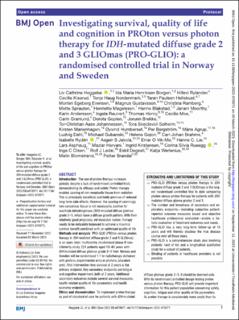Investigating survival, quality of life and cognition in PROton versus photon therapy for IDH- mutated diffuse grade 2 and 3 GLIOmas (PRO-GLIO): a randomised controlled trial in Norway and Sweden
Heggebø, Liv Cathrine; Borgen, Ida Maria Henriksen; Rylander, Hillevi; Kiserud, Cecilie E.; Nordenmark, Tonje Kristin Haug; Hellebust, Taran Annette Paulsen; Evensen, Morten Egeberg; Gustavsson, Magnus; Ramberg, Christina; Sprauten, Mette; Magelssen, Henriette; Blakstad, Hanne; Moorthy, Janani; Andersson, Karin; Raunert, Ingela; Henry, Thomas; Moe, Cecilie; Granlund, Carin; Goplen, Dorota; Brekke, Jorunn; Johannessen, Tor-Christian Aase; Solheim, Tora S; Marienhagen, Kirsten; Humberset, Øyvind; Bergström, Per; Agrup, Måns; Dahl, Ludvig; Gubanski, Michael; Gojon, Helene; Brahme, Carl-Johan; Rydén, Isabelle; Jakola, Asgeir Store; Vik-Mo, Einar O.; Lie, Hanne Cathrine; Asphaug, Lars; Hervani, Maziar; Kristensen, Ingrid; Rüegg, Corina Silvia; Olsen, Inge Christoffer; Ledal, Rolf J; Degsell, Eskil; Werlenius, Katja; Blomstrand, Malin; Brandal, Petter
Peer reviewed, Journal article
Published version
Permanent lenke
https://hdl.handle.net/11250/3098865Utgivelsesdato
2023Metadata
Vis full innførselSamlinger
- Institutt for klinisk og molekylær medisin [3524]
- Publikasjoner fra CRIStin - NTNU [38050]
- St. Olavs hospital [2504]
Sammendrag
Abstract
Introduction The use of proton therapy increases globally despite a lack of randomised controlled trials demonstrating its efficacy and safety. Proton therapy enables sparing of non-neoplastic tissue from radiation. This is principally beneficial and holds promise of reduced long-term side effects. However, the sparing of seemingly non-cancerous tissue is not necessarily positive for isocitrate dehydrogenase (IDH)-mutated diffuse gliomas grade 2–3, which have a diffuse growth pattern. With their relatively good prognosis, yet incurable nature, therapy needs to be delicately balanced to achieve a maximal survival benefit combined with an optimised quality of life.
Methods and analysis PRO-GLIO (PROton versus photon therapy in IDH-mutated diffuse grade 2 and 3 GLIOmas) is an open-label, multicentre, randomised phase III non-inferiority study. 224 patients aged 18–65 years with IDH-mutated diffuse gliomas grade 2–3 from Norway and Sweden will be randomised 1:1 to radiotherapy delivered with protons (experimental arm) or photons (standard arm). First intervention-free survival at 2 years is the primary endpoint. Key secondary endpoints are fatigue and cognitive impairment, both at 2 years. Additional secondary outcomes include several survival measures, health-related quality of life parameters and health economy endpoints.
Ethics and dissemination To implement proton therapy as part of standard of care for patients with IDH-mutated diffuse gliomas grade 2–3, it should be deemed safe. With its randomised controlled design testing proton versus photon therapy, PRO-GLIO will provide important information for this patient population concerning safety, cognition, fatigue and other quality of life parameters. As proton therapy is considerably more costly than its photon counterpart, cost-effectiveness will also be evaluated. PRO-GLIO is approved by ethical committees in Norway (Regional Committee for Medical & Health Research Ethics) and Sweden (The Swedish Ethical Review Authority) and patient inclusion has commenced. Trial results will be published in international peer-reviewed journals, relevant conferences, national and international meetings and expert forums.

